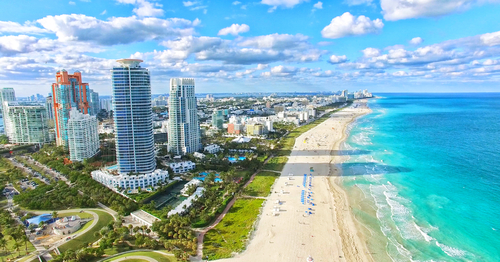Why Are Home Insurance Rates Going Up In Florida?

Florida homeowners have suffered in recent years as the cost of insurance skyrocketed. Unfortunately, there is a good chance rates will continue to climb in the future due to several reasons which include severe weather that leads to costly natural disasters, widespread insurance fraud as well as insurance companies fleeing the state.
Here are a few of the most common reasons that homeowners insurance is so expensive in the Sunshine State:
Natural disasters: As Helene and Milton have recently proved, major storms and hurricanes are not uncommon in Florida with the southeast coast being particularly vulnerable to substantial damage which leads to expensive homeowner insurance claims.
“As climate change compounds the frequency and severity of storms, and insurers struggle to keep up with compensating historic damages, consumers are seeing corresponding premium hikes,” said Franklin Manchester, principal global insurance advisor at AI and data company SAS in a recent U.S. News and World Report article.
This season’s hurricane season was a tough one for Florida with Helene causing massive damage followed by Milton a couple of weeks later. Milton was the ninth hurricane of the season with a month left to go. According to the National Oceanic and Atmospheric Administration (NOAA), it has been “an extremely active hurricane season that could rank among the busiest on record.”
Once the damage has been assessed and claims have been paid out, insurers will most likely request rates increases, and it could lead to more insurers leaving the state.
Lawsuits and fraud: Massive rates of insurance fraud has led to litigation, forcing insurers into court and those costs are passed onto policyholders via higher premiums. The majority of the fraud relates to roofing. Shifty roofing companies convince homeowners to sign an assignment of benefits form which allows the roofer to file a claim on the homeowners insurance policy. In most cases, the damage, or cost of the new roof is inflated, and the insurance company will pay out less than the roofer is requesting or deny the claim altogether.
This leads to a lawsuit that the insurer must defend, and those legal costs are passed on to policyholders through higher premiums. Data shows how bad the lawsuit situation has gotten in Florida, according to the Insurance Information Institute (III), in 2022, 79% of all homeowner insurance lawsuits happened in Florida despite the fact the state only accounts for 9% of total home insurance claims.
“This issue is exacerbated by Florida’s previous ‘one-way attorney fees’ law, which required insurers to cover the attorney fees of policyholders who won lawsuits but did not hold policyholders accountable for attorney fees if they lost,” said Diane Delaney, executive director of the Private Risk Management Association (PRMA), a nonprofit educational insurance organization in the recent U.S. News and World Report article.
Insurers flee the state: As natural disasters and fraud have hit the state hard, leading to expensive homeowner claims, many insurers have pulled out of the state altogether while others have stop writing coverage in certain parts of the state.Farmers, FedNat, Lexington, and Southern Fidelity are a few examples of insurers that have left the state. As insurers flee, it leaves homeowners with fewer choices, pushing up costs. In some cases, homeowners may not be able to find coverage in the private market and instead have to turn to Citizens Property which is the state insurer of last resort.
“Once you have extensive litigation that has plagued Florida for years and multiple hurricane events over consecutive years, you have seen national and international insurance companies retracting and pulling out of the state,” said Robert Guinn, home insurance expert and partner at Cole, Scott & Kissane in Miami, Florida in the recent U.S. News and World Report article.
“As these companies leave or take on fewer policies, the remaining insurance companies are left to insure those homeowners and business owners. As such, we have Florida-specific insurance carriers that cannot offset their risk throughout the United States and are thus forced to charge more to offset that risk and continue to defend a significant amount of litigation,” he continued in the article.
Luckily, nine new insurers have started writing policies in the state, but once the recent damage is tallied there is no guarantee insurers won’t start leaving the state again.
Rising cost of reinsurance: Insurance companies purchase insurance called reinsurance which helps offset their risk in the event a major incident occurs. Unfortunately, the cost of reinsurance has gone up dramatically over the last few years and those higher costs are passed onto policyholders. Experts worry that Hurricane Helene and Milton could send reinsurance costs up again, leading to higher premiums.
How to Lower Your Premium
Here are a few tips to help you save a bit on money on your insurance costs in Florida:
- Shop your coverage: This is probably the best way to lower your insurance costs. Insurers rate risk differently which can result in dramatically different premium quotes. Shop your coverage on a yearly basis and gather quotes from at least five insurers. Always make sure you are comparing apples to apples when it comes to coverage levels and deductibles. Shop Florida Home Insurance Rates Today!
- Increase deductibles: Raising your deductible is a great way to lower your insurance premiums. If you can afford to double your deductible, you should see a premium decrease. Always choose a deductible that you can easily afford in the event you have to make a claim on your policy.
- Insurer discounts: Insurance companies offer a variety of discounts so make sure all available discounts are being applied to your policy. Bundling your home and car insurance is a common discount as is a discount for a monitored security system, loyalty, fire resistant shingles and more.
